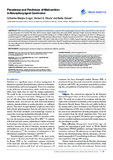| dc.contributor.author | Irungu, CW | |
| dc.contributor.author | Oburra, HO | |
| dc.contributor.author | Ochola, B | |
| dc.date.accessioned | 2015-06-13T08:39:47Z | |
| dc.date.available | 2015-06-13T08:39:47Z | |
| dc.date.issued | 2015-05 | |
| dc.identifier.citation | Clin Med Insights Ear Nose Throat. 2015 May 26;8:19-22 | en_US |
| dc.identifier.uri | http://www.ncbi.nlm.nih.gov/pubmed/26056508 | |
| dc.identifier.uri | http://hdl.handle.net/11295/84714 | |
| dc.description.abstract | We assessed the prevalence and predictors of malnutrition in patients with nasopharyngeal carcinoma. Sixty cases and 123 controls matched for age and gender were included. Bio-data, dietary history, height, weight, body mass index (BMI), ideal body weight, and serum albumin levels were recorded. Pretreatment weight loss of >5% was present in 35% of subjects (P < 0.0001). A BMI of < 18.5 kg/m2 was present in 13.3% (P < 0.001), percent ideal body weight of <90% was present in 30% (P < 0.001), and serum albumin levels <30 g/dL was present in 23.3% (P < 0.001) of cases. Nasopharyngeal carcinoma increased the likelihood of having a BMI <18.5 kg/m2 (odds ratio, 9.3 (3.4–25.3) P ≤0.001). Logistic regression shows that stage IV disease was associated with a decrease in all parameters except protein-calorie intake. Stage IV nasopharyngeal carcinoma is a predictive marker for weight loss and low serum albumin levels. Nutritional management is important for ensuring the patients’ ability to withstand chemoradiation and thus improve survival and quality of life. | en_US |
| dc.language.iso | en | en_US |
| dc.publisher | University of Nairobi | en_US |
| dc.subject | nasopharyngeal carcinoma, weight loss, malnutrition, albumin, nutrition | en_US |
| dc.title | Prevalence and predictors of malnutrition in nasopharyngeal carcinoma. | en_US |
| dc.type | Article | en_US |
| dc.type.material | en_US | en_US |

